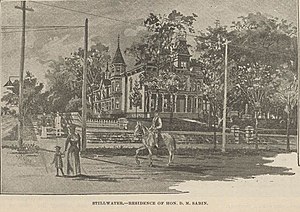Dwight M. Sabin
A period review of his life and career from 1883 noted that he arrived at Gettysburg in July, 1863, "on the second day of the decisive and dreadful battle of the rebellion, at the very period when the only regiment from Minnesota in the Army of the Republic was behaving so gallantly on Cemetery Hill,"[6] but this Minnesota reference, and its supposed significance to Sabin, may simply have been a political nod to his recent election to the US Senate at the time of the piece's publication.
While in the Federal Army, Sabin served as aide to the "chief medical officer of General Pleasanton's Cavalry," until several months' "exposure in the field" brought on an unidentified pulmonary illness that took him from camp duty to a clerkship in "the Third Auditor's Office" (Auditor of the War Department[7]) in the US Treasury Department in Washington, DC.
"[10] 1868 was the first year of record in which a warden protested the exploitative aspects of this system, arguing that, at the very least, "inmates be allowed to work for the benefit of the state rather than for private concerns.
[10] Initially the business manufactured doors, window sashes, cooperage (barrels) and the like, a logical progression from Sabin's lumber interests.
[11] The firm began producing threshing machines in 1876, and soon could pride itself as the largest manufacturer of the world famous model "Minnesotan Chief" thresher.
Sabin's election as US Senator in early 1883 followed the chaos that incumbent William Windom, a strong advocate of railroad regulation, had brought upon his own re-election.
Following 1880, when Windom had effectively abandoned his place (and his Committees) in the US Senate for an unsuccessful presidential run, he did not return to retake his 'own' seat under ideal circumstances.
By the 1883 elections, he had "antagonized in various ways a large number of his political associates,"[11] a loss of support that became amply clear in the first round of senatorial balloting.
In character, he "made no pretense to oratory, and was not known as a speech-making senator, but rather a hard working member in the interest of his state, especially in the line of transportation.
Sabin married twice, first, to Ellen Amelia Hutchins[6] and second, on July 1, 1891, to Jessie Larmon, daughter of Asabel and Susan Slee of Paducah, Kentucky.
May 1, 1844)[15] was the adoptive daughter of a doctor from Danielson, Connecticut, who married Dwight sometime between his return from his wartime service in D.C. and his departure for Minnesota.
For their family, Dwight and Ellen adopted, first, the sisters Blanche and Ethel (children of John B. Raymond of Fargo, a former congressional delegate for the Dakotas.[16]).
Together they were active participants in the social scene, the grand dinners, the gala birthday parties, the delegations to formal occasions such as Grant's funeral.
"[18] When Dwight entered a petition for divorce on the grounds of misuse of alcohol and morphine, the news made the front page of the New York Times.
The Times, which had in past coverage described Sabin's political talents as mediocre,[20] and been unstinting in their reports on his financial machinations, approached this sad domestic story from a widely sympathetic standpoint.


